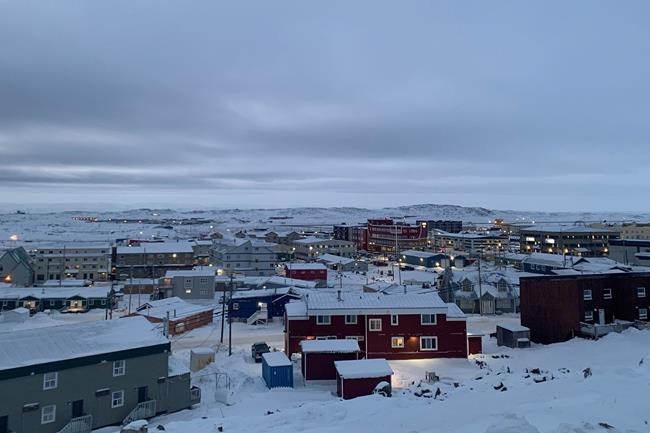IQALUIT, Nunavut — Nunavut is to start lifting a two-week lockdown on Wednesday as more people infected with COVID-19 recover.
The lockdown that shuttered all schools and non-essential businesses was put in place on Nov. 18 to curb the spread of the novel coronavirus that first appeared in the territory early this month.
Dr. Michael Patterson, the territory's chief public health officer, said Monday that 73 people had recovered from COVID-19 and 108 cases remained active. There were also four new cases, bringing Nunavut's total to 181.
No one who contracted COVID-19 in Nunavut has been hospitalized. Patterson said that's partly because more than half of the infections have been in residents under the age of 40.
Only Arviat, which had 86 active cases, will remain in lockdown for at least another two weeks, said Paterson. Travel to the community will still be restricted.
"Until we can be absolutely certain that there is no community transmission of COVID-19 in Arviat, restrictions will remain in effect for that community," Patterson told a news conference.
Arviat is experiencing "an infectious disease outbreak in crowded housing," so cases might continue to rise for a bit longer, he added.
"There is a chance that it will continue to spread for a little bit even within the houses that we've identified."
There were still eight active cases in Rankin Inlet and 14 in Whale Cove, but Patterson said there has been no community transmission in either community, so restrictions can be eased.
"We've identified all the houses that have cases of COVID-19 and all recent transmission in those two communities has been related to the people living in those houses," he said.
"The risk of it spreading elsewhere is small and less than the harms associated with the very strict measures that are in place."
Arviat, Rankin Inlet and Whale Cove are all coastal communities in the Kivalliq region on the western edge of Hudson Bay and have borne the brunt of the outbreak.
Schools will be allowed to open in both Rankin Inlet and Whale Cove, but elementary school students will attend three days a week and high school students will attend two days weekly on staggered schedules.
Government offices and all businesses will be allowed to open, but physical distancing will have to be maintained.
Travel to and from Whale Cove and Rankin Inlet will also be allowed starting Wednesday, but Patterson said his office still strongly advises against non-essential travel.
Outdoor gatherings in the two communities will be restricted to 50 people, while gatherings in homes will have to stick to household members plus 10 others.
Arenas have to remain closed, as well as hair salons and barber shops. Restaurants can only be open for takeout. Gyms will only be able to offer space for solo workouts.
In communities with no COVID-19 cases, students will attend school two to three days a week on staggered schedules.
Restaurants will be allowed to open at half capacity. Businesses will be able to operate as long as people maintain physical distancing.
Outdoor gatherings will be restricted to 50 people and gatherings in homes will be limited to the household plus 15 people.
Arenas and personal services will also be able to resume.
Patterson warned that if another outbreak were to occur, restrictions would be reintroduced.
This report by The Canadian Press was first published Nov. 30, 2020.
Emma Tranter, The Canadian Press



